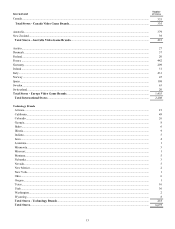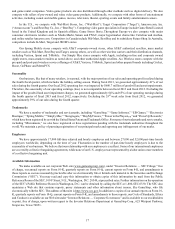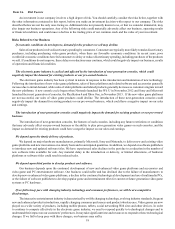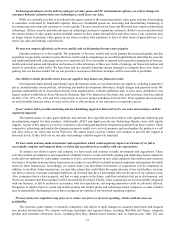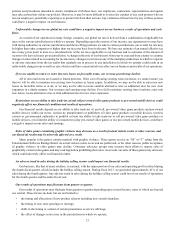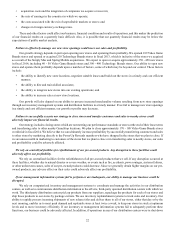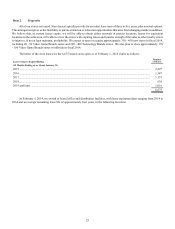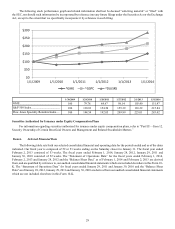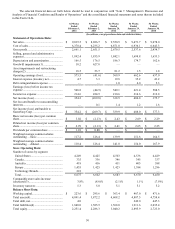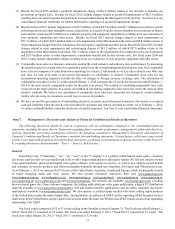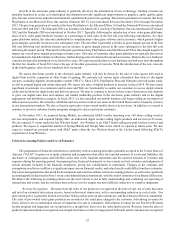GameStop 2013 Annual Report Download - page 40
Download and view the complete annual report
Please find page 40 of the 2013 GameStop annual report below. You can navigate through the pages in the report by either clicking on the pages listed below, or by using the keyword search tool below to find specific information within the annual report.23
or be disrupted for a prolonged period of time or if these centers were unable to accommodate the continued store growth in a
particular region, our business could suffer.
Data breaches involving customer or employee data stored by us could adversely affect our reputation and revenues.
We store confidential information with respect to our customers and employees. A compromise of our data security systems
or those of businesses we interact with could result in information related to our customers or employees being obtained by
unauthorized persons. Any such breach of our systems could lead to fraudulent activity resulting in claims and lawsuits against
us or other operational problems or interruptions in connection with such breaches. Consequently, despite our efforts, our security
measures have been breached in the past and may be breached in the future due to cyber attack, team member error, malfeasance,
fraudulent inducement or other acts; and unauthorized parties have in the past obtained, and may in the future obtain, access to
our data or our customers’ data. While costs associated with past security breaches have not been significant, any breach or
unauthorized access in the future could result in significant legal and financial exposure and damage to our reputation that could
potentially have an adverse effect on our business. While we also seek to obtain assurances that others we interact with will protect
confidential information, there is a risk the confidentiality of data held or accessed by others may be compromised. If a compromise
of our data security or function of our computer systems or website were to occur, it could have a material adverse effect on our
operating results and financial condition and, possibly, subject us to additional legal, regulatory and operating costs and damage
our reputation in the marketplace.
Also, the interpretation and enforcement of data protection laws in the United States, Europe and elsewhere are uncertain
and, in certain circumstances, contradictory. These laws may be interpreted and enforced in a manner that is inconsistent with our
policies and practices. If we are subject to data security breaches or government-imposed fines, we may have a loss in sales or be
forced to pay damages or other amounts, which could adversely affect profitability, or be subject to substantial costs related to
compliance.
Litigation and the outcomes of such litigation could negatively impact our future financial condition and results of
operations.
In the ordinary course of our business, we are, from time to time, subject to various litigation and legal proceedings. In the
future, the costs or results of such legal proceedings, individually or in the aggregate, could have a negative impact on our financial
condition, results of operations and cash flows.
Legislative actions and changes in accounting rules may cause our general and administrative and compliance costs to
increase and impact our future financial condition and results of operations.
In order to comply with laws adopted by the U.S. government or other U.S. or foreign regulatory bodies, we may be required
to increase our expenditures and hire additional personnel and additional outside legal, accounting and advisory services, all of
which may cause our general and administrative and compliance costs to increase. Significant workforce-related legislative changes
could increase our expenses and adversely affect our operations. Examples of possible workforce-related legislative changes
include changes to an employer's obligation to recognize collective bargaining units, the process by which collective bargaining
agreements are negotiated or imposed, minimum wage requirements, and health care mandates. In addition, changes in the
regulatory environment affecting Medicare reimbursements, product safety, supply chain transparency, and increased compliance
costs related to enforcement of federal and state wage and hour statutes and common law related to overtime, among others, could
cause our expenses to increase without an ability to pass through any increased expenses through higher prices. Environmental
legislation or other regulatory changes could impose unexpected costs or impact us more directly than other companies due to our
operations as a global retailer. Specifically, environmental legislation or international agreements affecting energy, carbon
emissions, and water or product materials are continually being explored by governing bodies. Increasing energy and fuel costs,
supply chain disruptions and other potential risks to our business, as well as any significant rule making or passage of any such
legislation, could materially increase the cost to transport our goods and materially adversely affect our results of operations.
Additionally, regulatory and enforcement activity focused on the retail industry has increased in recent years, increasing the risk
of fines and additional operational costs associated with compliance.
Our Board of Directors could change our dividend policy at any time.
We initiated our first cash dividend on our common stock during fiscal 2012. Notwithstanding the foregoing, there is no
assurance that we will continue to pay cash dividends on our common stock in the future. Certain provisions in our credit facility
triggered by certain borrowing levels restrict our ability to pay dividends in the future. Subject to any financial covenants in current
or future financing agreements that directly or indirectly restrict our ability to pay dividends, the payment of dividends is within
the discretion of our Board of Directors and will depend upon our future earnings and cash flow from operations, our capital
requirements, our financial condition and any other factors that the Board of Directors may consider. Unless we continue to pay


